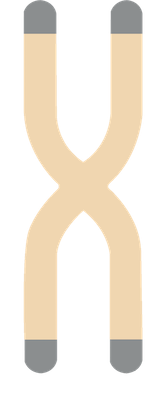Telomere testing
The key to gaining control of your health
Why should you measure the length of your telomeres?
The length of telomere is one of the most important biomarkers for ageing.
In every living organism, ageing is the result of a decrease in the number and function of the cells.
Telomeres play an important role in the ageing process and contribute to the emergence of age-related diseases.
What are telomeres?
The chromosomes contain our genetic material (DNA).
Telomeres are portions of the genetic material at the end of each chromosome.
Their main function is to prevent the chromosome ‘breaking’ when a cell is divided into two affiliates.
This is why telomeres are often compared with plastic caps at the ends of the cords, which prevent their rapid wear.
What are the essential benefits of testing our Telomeres?

Discovering your
true biological age

Personalised
medicine

Take control of your
ageing processes
Technically speaking
Telomeres are a complex structure of unique repetitions of DNA letters that act as a protective cover of our genetic material.
Their critical function in the cellular biological mechanism is the protection of our genetic data while allowing for the continuation of cell division.
Each time the cells are replicated, telomere decreases until they reach a point where cells can no longer be divided.
Finally, the telomeres become too small to allow the cells to reproduce.
The cell stops dividing and eventually dies.
The progressive reduction in telomeres leads to an increase in:
1
ageing cells
2
the loss of cells
3
Risk of developing diseases associated with ageing
Ageing is not only costly to society, it causes disruption in our daily life, decreases our quality of life, resulting in physical and emotional distress.
It is linked to an endless list of illnesses
There is an increased chance
- of cancer
- for diseases of the cardiovascular system
- for type 2 diabetes
- for chronic obstructive pulmonary disease
- some forms of dementia
- osteoporosis
and many others.
Have you ever wondered how well you are ageing?
The analysis of a person’s telomeres is an easy process, and makes the overall heath check:
- Predictive
Indicates the possibility of developing a particular disease.
- Preventive
It is therefore possible to treat and change lifestyle habits before a disease occurs, which in certain situations could be too late for an effective therapy.
- Personalised
We have the right treatment for the right patient at the right time.
The control of the individual’s own state of health by actively participating in improving it is decisive.

The TAT test examines more than 100,000 individual telomeres to determine the cellular, i.e. biological age of an individual.
The age a person shares with other people of similar physiology of the organism.
The percentage of short telomeres rather than their average length determines the onset of an illness.
Besides, the percentage of short telomere in an individual’s cells is a major indicator of cellular aging.
With the passing of time, the telomeres diminish.
Reproduction of cells is an extremely heterogeneous process that is influenced not only by genetics but by environmental factors and, of course, by our lifestyle choices.
Due to some factors in our lifestyle choices such as:
- Poor nutrition
- Psychological stress
- Lack of exercise
- Oxidative stress, among other things,
the telomere length decreases at a faster rate than normal, which means we age at an increased speed.
How do telomeres affect the onset of malignancy?
The small length of the telomere has an adverse effect on our health.
Their analysis can alert individuals in the high-risk group for malignancy so that in addition to the changes they need to make to toxic lifestyle habits, they are examined more regularly and from a younger age.
For example, women who know that they have a genetic history of breast cancer, if they also have short telomeres, should pay extra attention to their lifestyle and, of course, be more frequently examined.
The regulation of the length of the telomere is normally achieved by the enzyme telomerase, the activity of which is progressively disrupted during fetal differentiation in the body tissues while being maintained in the germ cells, activated lymphocytes and certain types of stem cells.
Telomere and genetic system of men and women
Maintaining the activity of telomerase for a longer period of time is essential for genital cells.
In recent years, telomere biology has become an important issue in the field of human reproduction.
Several studies focus on the relationship between telomere length, spermatogenesis and fertility of men as well as the development and quality of the embryo in IVF.
Also in polycystic ovaries, premature ovarian failure and endometriosis.
We believe that the length of telomeres in germ cells is related to reproductive capacity, with pathologies related to male and female fertility, and measuring the length of telomeres could be a marker of germ cell quality.
The length of telomeres could be considered as a molecular index of spermatogenesis and sperm quality and may be related to men’s fertility probability.
Less medical data, (though promising) is available for the ova and the size of the telomeres.
Increasing evidence of the role of the length of telomeres in human reproduction has extended the historical view to being considered only as an indicator of ageing.
What can we do if we have short telomeres?
With this information coming from the personalised report of your results, you will be able to discover and gain better control over your ageing and your present and future health.
What are the recommended lifestyle changes?
1
Ideal body weight and body composition with low body fat (less than 22% for women and less than 16% for men).
2
Reduction of visceral fat is very important.
3
Aerobic exercise and exercise with resistance on a daily basis.
4
Good sleep at night
5
Stress reduction
6
Refraining from smoking and all types of tobacco products
7
Treatment with peptides bioregulators
8
Biomimetic hormone therapy can reduce the rate of telomere loss.
What is the effect of diet on the length of our telomeres?
The foundations of a person’s physiology consist of what he eats, what he drinks, how he breathes.
A diet that increases inflammation at the cellular level will reduce telomere’s length faster.
Examples of such foods are processed carbohydrates, fast food, processed meats, soft drinks, most artificial sweeteners, trans-fat and saturated fats.
A diet with a large amount and variety of antioxidants that improves oxidative defence and reduces oxidative stress will slow the reduction of telomeres.
The consumption of fresh produce consisting mainly of:
- raw fruits and vegetables
- fiber
- monounsaturated fats
- omega-3 fatty acids
- open sea fish (not farm or ocean)
- high quality protein
will assist in maintaining telomere length.
It is recommended for at least 12 hours every night, 4 days a week not to eat (zero calorie intake).
What diseases effect a person’s telomeres?
diseases such as cardiovascular disease, insulin resistance, diabetes, arteriosclerosis, hypertension, dementia, affect the length of telomeres.
Correction of subclinical nutritional deficiencies that cause or burden these diseases is of great importance for the maintenance of telomeres.
In addition, homocysteine levels have been inversely combined with the length of telomeres.
That is, reducing levels of homocysteine through supplements of folate and vitamin B can reduce their rate of loss.
What is the role of dietary supplements in slowing the reduction of telomeres?
Oxidative stress can reduce the length of telomeres and cause cell ageing.
Antioxidant supplements can effectively reduce oxidative stress.
Reducing the body’s oxidative stress results in improved defence, better mitochondrial function, reduced inflammation, and slowing down aging.
Antioxidants, however, are not a common prescription for everyone.
Because, depending on the deficiencies or needs that an organism has at various stages of life, and especially in different health situations, they are synergistic and need to be balanced.
Add or remove some of these, change doses or stop taking them when our body does not need them.
Only in this way will we increase the antioxidant capacity at the cellular level that is critical to maintaining the length of telomeres.
How frequently should telomere length be measured?
The test should be done once a year to assess the pace and direction of telomere changes and to make adjustments to diet, nutritional supplements, weight management, exercise and other lifestyle modifications known to affect the length of the telomeres.
When a course of treatment is being followed, to increase telomere length, there will be a further evaluation in six months.
Schedule your telomere test today
Tel.: +30 (210) 64 28 674 – +30 (210) 64 51 818
 English
English Ελληνικα
Ελληνικα









